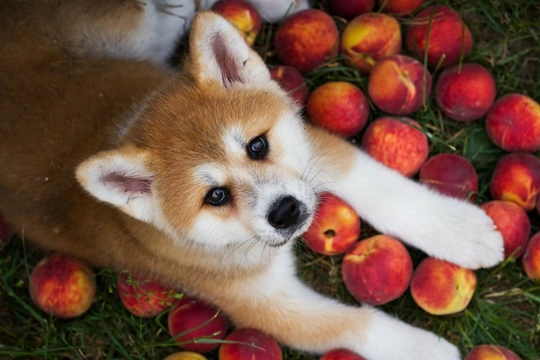
Are peach pits and fruit stones safe for dogs?
Many dogs enjoy snacking on fruit almost as much as they enjoy meat and dog treats, and when it comes to fruit with large stones – like peaches, plums, nectarines and even avocado, which is technically a fruit – you might find that your dog finds the stones themselves quite entertaining, because they can gnaw off the last scraps of the fruit’s flesh and play with or gnaw on the stone.
However, it is not really a good idea to let your dog have stones from fruit, or eat fruit with stones – for a variety of reasons, which we will look at in more detail within this article. Peach pits and stones from fruit of all types can pose a potential hazard to your dog, and should be kept well out of their reach and discarded safely when you have finished eating.
Read on to find out more about why peach pits and other types of hard fruit stones can be dangerous for your dog.
Some stone fruits are dangerous to dogs
Fruit might seem like a very innocuous food, which of course also comes with a lot of benefits for the eater – but the stones of certain types of fruit actually contain small quantities of cyanine in the kernel, the part of the fruit stone at the very centre that you don’t see until the stone has split or opened.
If your dog chews and gnaws on a peach pit or the stone from another type of fruit, they might get right down to the kernel and ingest some of the dangerous centre that contains cyanine. It is highly unlikely that eating the kernel from just one or two fruits would lead to the ingestion of enough cyanine to pose a hazard to your dog’s health – but it is much better to keep them well away from your dog, and avoid the risk entirely.
Additionally, if your dog scavenges or finds a peach pit or another type of fruit stone, it might be decaying or growing mould, which again, isn’t good for your dog if they eat it.
Something to bear in mind particularly if you live near an orchard or even grow a fruit tree of your own (such as plums or damsons) is that ripe fruit that drops off the tree before being picked will quickly ferment on the ground, which can cause your dog to get the runs and have an upset stomach if they eat a lot of it.
Fermenting, rotting fruit can even produce alcohol, which is a toxin for dogs and can make your dog quite sick, so bear this in mind.
Fruit stones can harm your dog’s teeth
Fruit stones are hard and tough on the outside, which is often why dogs will enjoy gnawing on them, but they are also hard and brittle enough to actually damage your dog’s teeth, causing cracks or breaks that will be painful for your dog, as well as expensive to treat by your vet.
They also run the risk of cutting your dog’s tongue and gums, which can be painful and create the right environment for infection to set in.
Fruit stones can pose a choking hazard
Fruit stones are also the right sort of size and shape to pose a potential choking hazard to your dog, because they can get stuck in their throats and occlude the airways. A choking dog will tend to panic, and try to inhale – which serves to lodge a blockage even more firmly in your dog’s throat, which can be fatal if you are not able to identify the issue and clear the blockage yourself very quickly.
Even cherry stones can potentially pose a choking hazard for smaller dogs, and so the best approach is to keep fruit stones well away from your dog, regardless of their size.
Ingesting fruit stones
If your dog crunches up and swallows parts of a fruit stone, the splintered shards of it can cause internal damage, which may not become evident until the damage has already been done.
Even if your dog successfully manages to swallow a fruit stone whole, it may be too large to pass through their digestive system naturally, and can potentially cause a dangerous blockage.
Fruit stones can damage your dog’s throat
Fruit stones are rough on the outside, which can graze the delicate lining of your dog’s oesophagus, or food tube – which will give them a sore throat, make them feel rather uncomfortable, and potentially, make them reluctant to eat.
If your dog chews on or eats peach pits and other fruit stones regularly, this can actually lead to scarring of the oesophagus, as well as increasing the risk of them accidentally inhaling a particle from the stone into their lungs, which can lead to serious complications such as pneumonia.
Choose dog-safe fruits to give your dog a healthy treat when you want to – but leave fruits with stones to the human members of your family!



